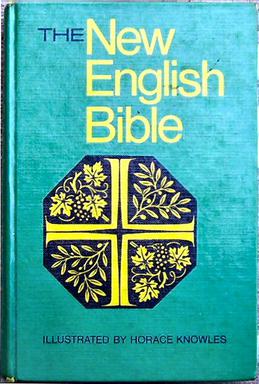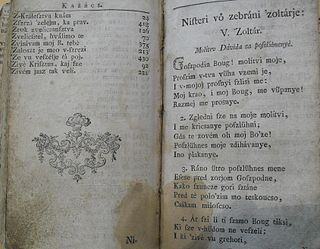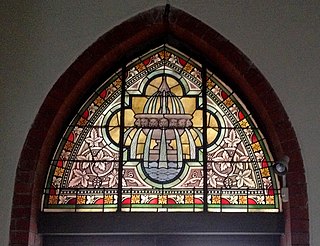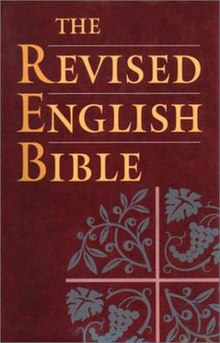
The Revised Standard Version (RSV) is an English translation of the Bible published in 1952 by the Division of Christian Education of the National Council of the Churches of Christ in the USA. This translation itself is a revision of the American Standard Version (ASV) of 1901, and was intended to be a readable and literally accurate modern English translation which aimed to "preserve all that is best in the English Bible as it has been known and used through the centuries" and "to put the message of the Bible in simple, enduring words that are worthy to stand in the great Tyndale-King James tradition."

The New Revised Standard Version (NRSV) is an English translation of the Bible published in 1989 by the National Council of Churches. The NRSV was intended as a translation to serve devotional, liturgical and scholarly needs of the broadest possible range of Christian religious adherents. At present, the New Revised Standard Version is the version most commonly preferred by biblical scholars; this is due to its basis on what are often considered the oldest and most reliable manuscripts, and its strict adherence to word-for-word translation.

The English Standard Version (ESV) is a translation of the Bible in contemporary English. Published in 2001 by Crossway, the ESV was "created by a team of more than 100 leading evangelical scholars and pastors." The ESV relies on recently published critical editions of the original Hebrew and Greek texts.

The New English Bible (NEB) is an English translation of the Bible. The New Testament was published in 1961 and the Old Testament was published on 16 March 1970. In 1989, it was significantly revised and republished as the Revised English Bible.

The Revised Standard Version Catholic Edition (RSVCE) is an English translation of the Bible first published in 1966. In 1965, the Catholic Biblical Association adapted, under the editorship of Bernard Orchard OSB and Reginald C. Fuller, the Revised Standard Version (RSV) for Catholic use. It contains the deuterocanonical books of the Old Testament placed in the traditional order of the Vulgate. The editors' stated aim for the RSV Catholic Edition was "to make the minimum number of alterations, and to change only what seemed absolutely necessary in the light of Catholic tradition."

The New Revised Standard Version, Catholic Edition (NRSV-CE) is a translation of the Bible closely based on the New Revised Standard Version (NRSV) but including the deuterocanonical books and adapted for the use of Catholics with the approval of the Catholic Church.

2 Esdras is an apocalyptic book in some English versions of the Bible. Tradition ascribes it to Ezra, a scribe and priest of the fifth century BCE, but scholarship places its composition between 70 and 218 CE.
The name 'Esdras' is found in the title of four texts attributed to, or associated with, the prophet Ezra. The naming convention of the four books of Esdras differs between church traditions; and has changed over time.

The Oxford Annotated Bible (OAB), published also as the New Oxford Annotated Bible (NOAB), is a study Bible published by the Oxford University Press. The notes and the study material feature in-depth academic research from nondenominational perspectives, specifically secular perspectives for "Bible-as-literature" with a focus on the most recent advances in historical criticism and related disciplines, with contributors from mainline Protestant, Roman Catholic, Jewish, and nonreligious interpretative traditions.
Gender in Bible translation concerns various issues, such as the gender of God and generic antecedents in reference to people. Bruce Metzger states that the English language is so biased towards the male gender that it restricts and obscures the meaning of the original language, which was more gender-inclusive than a literal translation would convey. Wayne Grudem disagrees, believing that a translation should try to match the words of the original language rather than introduce the translator's opinion as to whether the original words meant to include both sexes or not, and that trying to be gender-neutral results in vague and contorted writing style. Michael Marlowe argues from a third standpoint, that the Bible is patriarchal, and gender-neutral language distorts its meaning in an attempt by translators like Metzger to impose their progressive modern views on the text. The topic has theological and political undercurrents. Paul Mankowski says that inclusive-language translators are bowing to feminist political taboos rather than trying to translate accurately, while Marmy Clason says that their opponents are motivated by hostility to feminism rather than fidelity to the original meaning.

Psalm 5 is the fifth psalm of the Book of Psalms, beginning in English in the King James Version: "Give ear to my words, O LORD, consider my meditation". In Latin, it is known as "Verba mea auribus percipe Domine". The psalm is traditionally attributed to David. It is a reflection of how the righteous man prays for deliverance not only for freedom from suffering, but to allow himself to be able to serve God without distraction. The New King James Version entitles it "A Prayer for Guidance".

Psalm 36 is the 36th psalm of the Book of Psalms, beginning in English in the King James Version: "The transgression of the wicked saith within my heart". The Book of Psalms is part of the third section of the Hebrew Bible, and a book of the Christian Old Testament. In the slightly different numbering system used in the Greek Septuagint and Latin Vulgate translations of the Bible, this psalm is Psalm 35. In Latin, it is known as Dixit iniustus or Dixit injustus. The psalm is a hymn psalm, attributed to David.

A Protestant Bible is a Christian Bible whose translation or revision was produced by Protestants. Such Bibles comprise 39 books of the Old Testament and 27 books of the New Testament for a total of 66 books. Some Protestants use Bibles which also include 14 additional books in a section known as the Apocrypha bringing the total to 80 books. This is often contrasted with the 73 books of the Catholic Bible, which includes seven deuterocanonical books as a part of the Old Testament. The division between protocanonical and deuterocanonical books is not accepted by all Protestants who simply view books as being canonical or not and therefore classify books found in the deuterocanon, along with other books, as part of the Apocrypha.
The Open English Bible (OEB) is a freely redistributable modern translation based on the Twentieth Century New Testament translation. A work in progress, with its first publication in August 2010, the OEB is edited and distributed by Russell Allen. It is licensed with a Creative Commons zero license, which allows free use of the content and allows forking of the content and a new translation to be made based on it. Its name and the distribution of all text and related software through GitHub reinforce the open source approach.

Revelation 12 is the twelfth chapter of the Book of Revelation or the Apocalypse of John in the New Testament of the Christian Bible. The book is traditionally attributed to John the Apostle, but the precise identity of the author remains a point of academic debate. This chapter contains the accounts about the woman, the dragon, and the child, followed by the war between Michael and the dragon, then the appearance of the monster from the sea. William Robertson Nicoll, a Scottish Free Church minister, suggests that in this chapter the writer has created a Christianised version of a Jewish source which "described the birth of the Messiah in terms borrowed from ... cosmological myths [such as] that of the conflict between the sun-god and the dragon of darkness and the deep".

Romans 2 is the second chapter of the Epistle to the Romans in the New Testament of the Christian Bible. It is authored by Paul the Apostle, while he was in Corinth in the mid-50s AD, with the help of an amanuensis (secretary), Tertius, who adds his own greeting in Romans 16:22. Although "the main theme of the Epistle [is] the doctrine of justification by faith", in verse 6 Paul "lays down with unmistakable definiteness and precision the doctrine that works, what a man has done, the moral tenor of his life, will be the standard by which he will be judged at the last day".

Romans 3 is the third chapter of the Epistle to the Romans in the New Testament of the Christian Bible. It was composed by Paul the Apostle, while he was in Corinth in the mid-50s AD, with the help of an amanuensis (secretary), Tertius, who added his own greeting in Romans 16:22.
William Duff McHardy, CBE was a Scottish scholar of Biblical languages. From 1960 to 1978, he was Regius Professor of Hebrew at the University of Oxford. He contributed to the New English Bible, and was director of the Revised English Bible.

2 Peter 3 is the third chapter of the Second Epistle of Peter in the New Testament of the Christian Bible. The author identifies himself as "Simon Peter, a bondservant and apostle of Jesus Christ" and the epistle is traditionally attributed to Peter the Apostle. Alternatively, it is considered a work of Peter's followers, written between 60-90 CE.

Proverbs 11 is the eleventh chapter of the Book of Proverbs in the Hebrew Bible or the Old Testament of the Christian Bible. The book is a compilation of several wisdom literature collections, with the heading in 1:1 may be intended to regard Solomon as the traditional author of the whole book, but the dates of the individual collections are difficult to determine, and the book probably obtained its final shape in the post-exilic period. This chapter is a part of the second collection of the book.















